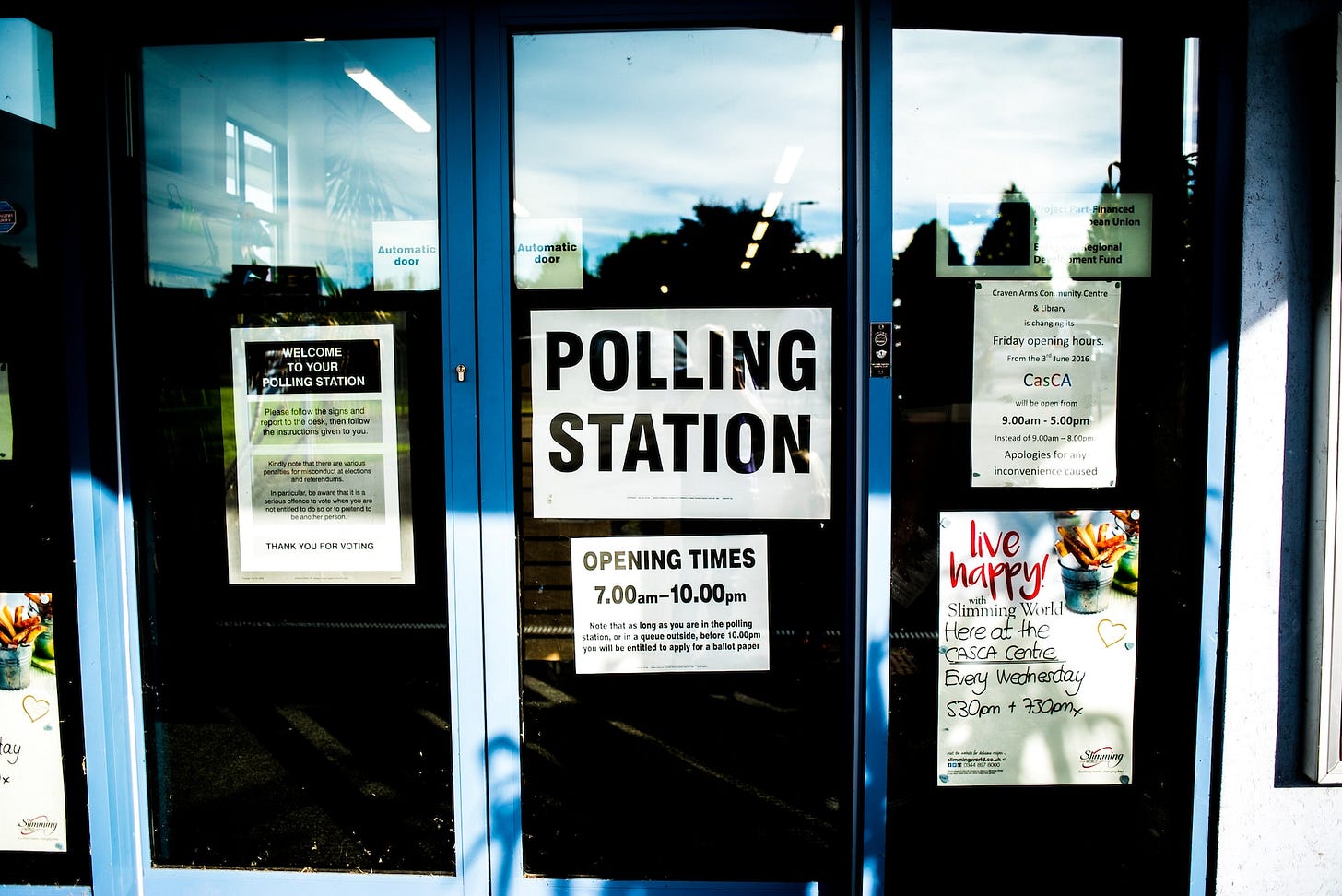The truth about Latino voter roundtables
Election Day should get us asking more deeply about how we frame Latinx voting
This election season, you have seen dozens of Latinx voter panels. They’re much like this Texas Newsroom one. In them, a Hispanic voter gives opinions about relevant issues. 🗣️ Or the content is a toundtable like this On Point one: Latinos of varying prominence sharing their viewpoints on issues. This year, the popular roundup is around Latinos and Republican recruitment.
We are in an era where there is plenty of critique about horse race reporting. 🐴 Can we put the current “Latino vote” panel approach under that microscope?
YES. 🙌 For America Amplified, I wrote about some of the tropes we see in Latino voter coverage. I note one of the worst outcomes is how poor journalism contributes to indifference. ☠️ The constant drumbeat of conflicting Hispanic opinion rarely tells us anything, nor sparks greater audience understanding.
The classic Latino voter roundtable piece creates issues for a few reasons:
Not enough conversations about where we live and how it may influence our politics. 🏙️ Urban-rural splits have been extensively researched. However, the issue of Hispanics voting differently based on urban, exurban and rural location is only reflected on in shorthand, if at all.
Roundtables focus on ethnicity, but rarely into the nuances of it. 👪 Many a panel talks to a mom, a single parent, etc. about what they think as Latinos, but doesn’t dig into their lives as Latinos. Ipsos is among those tracking Latine cultural trends, including the rise in Hispanics who identify as white, for example.
No talk about inequality and privilege among Latinos and the nation. 💭 You may read about the working-class Latinx voter or the upper-class one and what their opinions may be, but the structural issues that got us here are rarely discussed.
We can do better by now. If we’re going to do the Latino/a voter roundtable in the closing days of Election 2022, let’s envision what an insightful discussion with these important voters can be. 👇🏽
What elements can we consider in a Latino voter panel? Here are a few recommendations:
Explain your vetting process. How do people show up in these Latino voter roundtables anyway? 🤔 Explaining how you select respondents may help you build trust – or show you that more vigilance is in order.
Give a fuller look at who your panelists are, and share what you asked. What kinds of families are Hispanic voters in (there is growing data on mixed marriage and Latinos)? What are the racial/ethnic demographics where they live? 🗠 Do they identify as white or something else? Such factors may influence viewpoints and political leanings, yet Latino voters are seldom asked.
Hyperfocus. It’s well established that Hispanics are represented across class, race, location, etc. We don’t need to choose everyone to get that idea – which becomes no idea at all – about Latinos, though. 😟 A unique roundtable could take on a neighborhood, a generational lens (e.g. first-gen Hispanics), or something more tailored. Potential leads here via a new UCLA Latino Policy and Politics Institute study.
Check in Dec. 8. Whatever your panel is, it might be beneficial to follow up with your panelists about how they feel about the results one month later. 🤙🏽
Latine voters have growing numbers among voter demos, at times opposing viewpoints, and have perspectives on lots of election subjects. We know this already, and we can lean in on richer reporting. Our communities, the issues they care about, and a wider mission of helping audiences understand our world better depend on it. 🟢
La próxima ⌛
The next OIGO is in your inbox November 18. Launching content and engagement initiatives reaching out to Latinos is hard. Next OIGO, we’ll talk to Celeste Gracia at North Carolina’s WUNC. She’ll discuss the station’s efforts, the challenges facing organizations trying to lift off endeavors, and more.
I’m joining Edmundo Resendez at this month’s Our Hour. Details here for upcoming events.
-- Ernesto
Cafecito: stories to discuss ☕
The Spanish Language Disinformation Coalition is speaking to many outlets about election-time misinformation circulating in Spanish.
Twitter is partnering with a major international news organization to elevate credible news sources available in Spanish. “AFP's collaboration with Twitter to contextualize Spanish content seems particularly appropriate in allowing carefully verified information to be highlighted.” - Grégoire Lemarchand says.
The Christian nationalism story made the rounds for the midterms, and the Latinos who believe such probably deserves attention.
The Corporation for Public Broadcasting has a superb review of Spanish-language content in public media.
Colorado public and nonprofit media have shared findings of research into the listening/watching/reading habits of local Latinx audiences.
El radar: try this 📡
Find interesting Latino incumbent races. The Texas Tribune last month covered one of the more pitched Hispanic reelection bids. Lina Hidalgo unexpectedly rose to power in Harris County, where Houston is located, during the Trump years. High-profile scandals, a well-funded Republican opponent, and the abolition of straight-ticket voting have now imperiled her political career.
Investigate Latinx homelessness. Nationwide, the unhoused are an election year talking point. KQED’s Vanessa Rancano explored why we’re seeing more Hispanics on the streets than in the past, and ways to address their needs.
Where are candidates going direct to Latinos? Axios is among many outlets covering how candidates are passing on traditional media. Most focus on political division. The final weekend before Election Day might be the time to see how many candidates are focusing major efforts to win over Hispanics, separate from media appearances in traditional outlets.
Concentrate of where Hispanic wealth is growing locally. This story about the Creser Capital Fund made the rounds, but it’s short on localization. Funders nationwide are investing in Latine businesses. Is this showing up in your community?
Look at translation of emergency alerts. Halle Zander covers this issue in Colorado and I’m sure it’s not uncommon. Agencies say they’re using Google Translate and other machine translations for critical communications. The problem is that these translations can be wrong or inaccurate.
🥤 You can buy me a coffee if you’d like to support the newsletter.








Such great points! Thank you for sharing this!